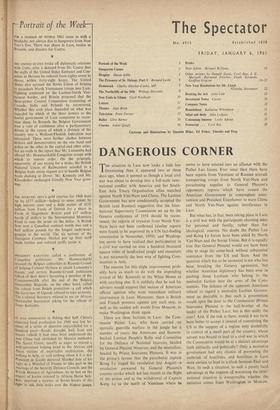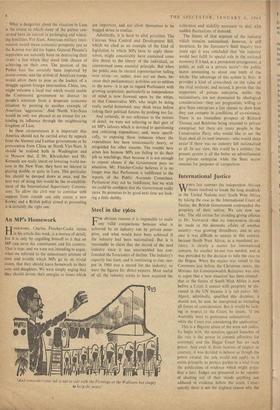DANGEROUS CORNER
rr HE situation in Laos now looks a little less I threatening than it appeared two or three days ago, when it seemed as though a local civil war was about to develop into a full-scale inter- national conflict with America and her South- East Asia Treaty Organisation allies matched against North Viet-Nam and China. The Laotian Government has now conditionally accepted the British (and Russian) suggestion that the Inter- national Supervisory Commission set up by the Geneva conference of 1954 should be recon- vened; the rel3orts of inyasion from North Viet- Nam have not been confirmed (similar reports were found to be unproved by a UN fact-finding commission in November, 1959); and Washing- ton seems to have realised that participation in a civil war carried on over a hundred thousand square miles of landlocked jungle and mountain is not necessarily the best way of fighting Com- munism in Asia.
The reasons for this slight improvement prob- ably have as much to do with the impending arrival of Mr. Kennedy at the White House as with anything else. It is unlikely that he and his advisers would support that section of American official opinion who want immediate military intervention in Laos. Moreover, there is British and French pressure against any such step, as well as the sudden soft words from Moscow, to make Washington think again.
There are three factions in Laos; the Com- munist Pathet Lao, who have carried on sporadic guerrilla warfare in the jungle for a number of years; the American- and Siamese- backed Laotian People's Rally and Committee for the Defence of National Interests, headed by General Phoumi Nosavan; and the neutralists, headed by Prince Souvanna Phduma. It was in the prince's favour that the parachutist captain Kong Le staged his revolution last August—a revolution answered by General Phoumi's counter-stroke which led last month to the flight of the prince and to the withdrawal of Captain Kong Le to the north of Vientiane where he seems to have entered into an alliance with the Pathet Lao forces. Ever since then there have been reports from Vientiane of Russian aircraft transporting troops from North Viet-Nam and parachuting supplies to General Phoumi's opponents; reports which have caused the American Government to contemplate inter- vention and President Eisenhower to warn China and North Viet-Nam against interference in Laos.
But what has, in fact, been taking place in Laos is a civil war with the participants choosing sides for personal and family, rather than for ideological, reasons. No doubt the Pathet Lao and Kong Le forces have been aided by North Viet-Nam and the Soviet Union. But it is equally true that General Phoumi would not have been able to stage his come-back without substantial assistance from the US and Siam. And the question which has to be answered is not who has been breaking the Geneva agreement, but whether American diplomacy has been wise in pushing those Laotians who belong to the neutralist faction into the arms of the Com- munists. The defence of the apparent American refusal to regard a neutralist Laotian Govern- ment as desirable is that such a government would open the door to the Communists (Prince Souvanna Phoumi is the half-brother of the leader of the Pathet Lao); but is this really the case? And, if the risk is there, would it not have been better to accept it instead of committing the US to the support of a regime only doubtfully in control of a small part of the country, whose advent was bound. to lead to a civil war in which the Communists would be at a distinct advantage both militarily and politically? Only a neutralist government had any chance of preventing the outbreak of hostilities, and hostilities in Laos were certain to lead to a clash between East and West. In such a situation, to seek a purely local advantage at the expense of worsening the inter- national situation is irresponsible whether the initiative comes from Washington or Moscow. What is dangerous about the situation in Laos is the extent to which many of the parties con- cerned have an interest in prolonging and widen- ing hostilities. For Siam, American military inter- vention would mean economic prosperity just as the Korean war did for Japan. General Phoumi's supporters arc naturally keen on destroying their rivals—a feat which they stand little chance of achieving on their own. The position of the Pathet Lao has certainly been improved by recent events; and the arrival of American troops would allow them to pose as the leaders of a struggle against foreign intervention. China, too, might welcome a local war which would enable the Communist government to distract its people's attention from a desperate economic situation by pointing to another example of American 'aggression.' And North Viet-Nam would be only too pleased at an excuse for ex- tending its influence through the neighbouring kingdom of Laos.
In these circumstances it is important that America should not be carried away by appeals from the Siamese and Laotian governments or by provocation from China or North Viet-Nam. It should be realised both in Washington and in Moscow that, if Mr. Khrushchev and Mr. Kennedy are really intent on lowering world ten- sion in the New Year, they have no interest in playing double or quits in Laos. This particular fire should be damped down at once, and the best way of doing this would be the re-establish- ment of the International Supervisory Commis- sion. To allow the civil war to continue with support from outside can only create a new Korea; and a British policy aimed at preventing it is certainly the right one.











































 Previous page
Previous page